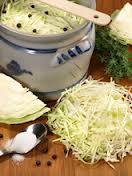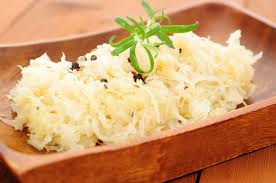Sauerkraut - Folklore, Facts and History
 Often considered a traditional German food, sauerkraut has long been consumed for its delightfully tangy taste. The tradition of fermenting cabbage dates back at least six thousand years, to ancient China, where it was served as a staple food for those who built the Great Wall.
Often considered a traditional German food, sauerkraut has long been consumed for its delightfully tangy taste. The tradition of fermenting cabbage dates back at least six thousand years, to ancient China, where it was served as a staple food for those who built the Great Wall.
A little sauerkraut folklore
In most locations, cabbage is harvested in late fall, and fermentation is the best way to preserve it for the winter months. By the year’s end the sauerkraut has fully fermented, aged, and matured, so it’s no wonder that New Year’s Day traditions often include eating sauerkraut.
One such tradition is pork and sauerkraut. Pennsylvania German folklore symbolizes this combination; the swelling of the sauerkraut is ‘bounty’, and just as pigs ‘root forward’, so you will move ‘forward’ if your New Years meal includes pork.
Eating raw cultured veggies, including sauerkraut, on New Year’s Day is said to bring good fortune. Apparently this is because the ‘green’ color of the veggies is associated with money.
Another bit of folklore is that the ‘long’ strands of sauerkraut can potentially represent a ‘long’ life. And according to an old Polish proverb, “Where there is beet soup and sauerkraut, there is plenty.”
In sickness and in health
Captain Cook's sailors were fed fermented cabbage on their voyages, since it was well known at that time as an effective way to prevent scurvy. We now know that this is due to the action of live lactic bacteria, which facilitate the synthesis of vitamin C.
 Rich in vitamins C, B and K, sauerkraut is even more nutritious than fresh cabbage, since the fermentation process increases bioavailability.
Rich in vitamins C, B and K, sauerkraut is even more nutritious than fresh cabbage, since the fermentation process increases bioavailability.
Sauerkraut is a good source of several minerals, including calcium and magnesium. It also has some antioxidant properties, such as lutein and zeaxanthin, which are associated with maintaining good eye health.
The juice from sauerkraut is a concentrated source of nutrients that has been used for medicinal purposes.
Ever hear of Vitamin U? This was named by Dr. Garrett Cheney, who found that cabbage juice worked wonders with the treatment of peptic ulcers.
Finnish researchers found that one property of sauerkraut inhibits the growth of cancer cells in test tube and animal studies. And in a 2010 Polish study they concluded that “... induction of the key detoxifying enzymes by cabbage juices, particularly sauerkraut, may be responsible for their chemopreventive activity demonstrated by epidemiological studies and in animal models". Sauerkraut juice is included in the Budwig preventative and curative anti-cancer diet.
DIY (Do It Yourself) sauerkraut
Making sauerkraut is a very satisfying project. It is easy and has only a few ingredients. Check out this video for instructions on how to make sauerkraut. And here are a few additional tips that can help with the success of turning a cabbage into delicious raw fermented sauerkraut:
- As with all foods you make at home, always start with the freshest ingredients. To maximize nutrients choose organically grown veggies that are harvested at the peak of ripeness.
- We suggest using a starter culture made for fermenting vegetables. Using only salt, or a combination of salt and whey, can give inconsistent results. Caldwell’s Starter Culture is the only starter culture developed specifically for fermenting vegetables!
- If you manage to hold off eating it for the 6 to 8 weeks, you get extra delicious gourmet sauerkraut!
 Ready-made traditional raw fermented sauerkraut
Ready-made traditional raw fermented sauerkraut
No time to make your own sauerkraut? Why not enjoy the tangy taste and crispness of Caldwell’s Organic Sauerkraut, easily stored in your freezer and ready to eat.
Kids love sauerkraut too - here's Simon's 3-year-old enjoying hers straight from the package!
Disclaimer: These statements have not been evaluated by the Food and Drug Administration. These products are not intended to diagnose, treat, cure, or prevent any disease.
Information provided in this article is not designed to and does not provide medical advice, professional diagnosis, opinion, treatment, or services to you or to any other individual. This is general information for educational purposes only. The information provided is not a substitute for medical or professional care, and you should not use the information in place of a visit, call, consultation, or the advice of your physician or other healthcare provider.
Wise Choice Marketing Inc is not liable or responsible for any advice, course of treatment, diagnosis, or any other information, services, or product you obtain through Wise Choice Marketing Inc.


 Loading... Please wait...
Loading... Please wait...













